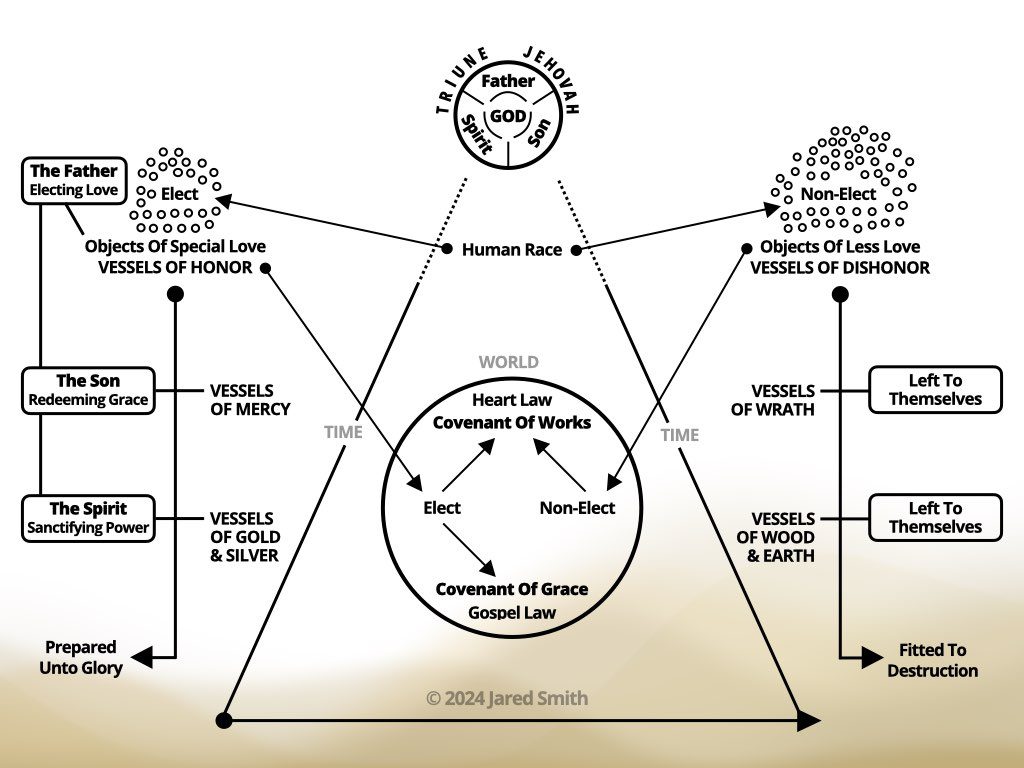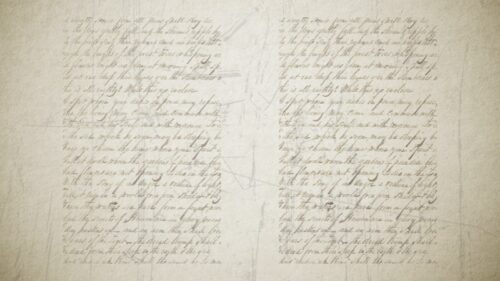Take My Life And Let It Be
The Apostle Paul instructed the believers at Colosse to teach and admonish one another in psalms, hymns and spiritual songs. That is what I hope to do by explaining the meaning of this hymn, against the backdrop of the Framework of Sovereign Grace.
[An automated transcript of the teaching video]
The Apostle Paul instructed the churches in Colosse to teach and admonish one another in psalms, hymns and spiritual songs. That’s what I intend to do by explaining the meaning of this hymn—Take My Life And Let It Be. I’d like to explain the meaning of the hymn against the backdrop of the Framework of Sovereign Grace, which is God’s master plan for the ages.

I’d like to read for you the six stanzas of the hymn.
1 Take my life and let it be,
Consecrated, Lord, to thee.
Take my moments and my days;
Let them flow in endless praise.
2 Take my hands and let them move,
At the impulse of Thy love.
Take my feet and let them be,
Swift and beautiful for thee.
3 Take my voice and let me sing,
Always, only, for my King.
Take my lips and let them be,
Filled with messages from Thee.
4 Take my silver and my gold;
Not a mite would I withhold.
Take my intellect and use,
Every power as Thou shalt choose.
5 Take my will and make it Thine;
It shall be no longer mine.
Take my heart it is Thine own;
It shall be Thy royal throne.
6 Take my love; my Lord, I pour,
At Thy feet its treasure store.
Take myself, and I will be,
Ever, only, all for Thee.
The hymn, no doubt is speaking about the believer’s consecration to Christ. And, if we look at the Framework of Sovereign Grace, it fits within the third branch of the gospel. The Spirit of God having conquered the soul of the sinner, uniting the soul with the Lord Jesus Christ, communicating the life and the graces of Christ to the soul—we are therefore made alive unto God through Jesus Christ our Lord, and enabled to exercise the fruit of our union with Christ, among which is saving faith and a love and commitment that is granted us through the communication of the Spirit, of Christ’s graces or virtues. And you see, it’s in this sense, when the sinner is born again, that he or she is placed in a condition of being able to consecrate his or her life to the Lord Jesus Christ. A consecration of one’s life. You’ll remember the apostle Paul, when he wrote to the churches in Corinth, he was concerned about them because they were riddled with problems. And one of them happened to have been the issue of fornication. Some of the members of that church, young and old, were giving their bodies over in an immoral way. And in order to challenge them, he says to those regenerate sinners, Know you not that your body is the temple of the Holy Spirit? That the Spirit of God indwells you and therefore you should not use the members of your body as instruments unto sin, but you should use them as instruments unto righteousness, for the Spirit of God in dwells you. So, back to the Framework of Sovereign Grace. Not only does the Spirit of God unite the soul with Christ—a spiritual union—but the Spirit of God Himself indwells the soul. The Spirit of God indwells the soul. And where does the soul reside in the body? Well, we often say, here’s the soul (pointing to the heart). No, no, the soul resides in all parts of the body. The soul is in my fingers and my hands and my arms. If an arm is amputated, is part of my soul cut off as well? No. The soul simply retracts into the other members of the body. You see, the soul fills every member of the body. And that means what I do with my hands, or where I look with my eyes, or what I listen to with my ears, or where I take my body in various places of the world—I take with me everywhere the Spirit of God. And that is why Paul uses this as an argument to encourage the believer in Christ—not to yield the members of the body as an instrument unto sin, but to consecrate our bodies and all that we have unto the Lord Jesus Christ. Now, isn’t this what Paul said in Romans chapter 12—I beseech you, therefore brethren, by the mercies of God, that you present your bodies a living sacrifice, holy, acceptable unto God, which is your reasonable service. And so, that’s the meaning of this hymn, my dear friends. It is a consecration of ourselves to Christ, because the Spirit of God is sanctifying us.
Stanza 1
“Take my life and let it be,
Consecrated, Lord, to thee.
Take my moments and my days;
Let them flow in endless praise.”
Our times are in the hand of God. Let us therefore be patient. Let us wait on the Lord for Him to bring about His purposes in our lives. If we’re truly consecrated to Christ and we’ve consecrated the moments and hours and days and months and years of our lives to Him, we should not be so easily frustrated and so desperate to manipulate situations to try and accomplish things we want. Rather, we should wait on the Lord, for these are His moments, His days, His months, His years.
Stanza 2
“Take my hands and let them move,
At the impulse of Thy love.
Take my feet and let them be,
Swift and beautiful for thee.”
How you use your hands, and where you take your body with your feet—all of these are considerations on the level of consecration or commitment that you’re making to Christ.
Stanza 3
“Take my voice and let me sing,
Always, only, for my King.
Take my lips and let them be,
Filled with messages from Thee.”
How do we use our lips? How do we use our words? What do we communicate? What’s the content of our songs? Can you truly say, my dear friend, that you’ve consecrated your lips and your voice to the Lord Jesus Christ?
Stanza 4
“Take my silver and my gold;
Not a mite would I withhold.
Take my intellect and use,
Every power as Thou shalt choose.”
How is it with you? Your finances, your possessions, the conveniences and comforts of your life—while you’re enjoying these blessings that God has bestowed upon you? Do you ultimately recognize that these blessings belong to God? They are His. You’ve consecrated even that to Him. What about your intellect? What type of reading materials are you giving yourself over to? What type of television programs or TV shows are you watching? What type of philosophies and science are you reading and giving yourself to? What about social media and the news outlets and the propaganda that’s spewed out every day, and you open your eyes, your ears, your intellect to it? Are you guarding your mind? Do you view your intellect to be consecrated to Christ? And therefore you place a force field around it? Do you filter the things that enter into your mind?
Stanza 5
“Take my will and make it Thine;
It shall be no longer mine.”
Oh, how we need that prayer! How was it for Jesus before He went to the cross? Did He not pray specifically to let the cup pass from Him? But then He qualified the prayer and he said, Yet not My will, but Thine be done. Are you able, my dear friend, to do likewise? To pray specifically for things you have a desire for? Yet in the end, you hand it to the Lord; you resign it to it to Him? And in your consecration you say, Not my will, but Thine be done!
“Take my heart it is Thine own;
It shall be Thy royal throne.”
Stanza 6
“Take my love; my Lord, I pour,
At Thy feet its treasure store.
Take myself, and I will be,
Ever, only, all for Thee.”
Is that your testimony? Are you able to take your affections, your love, that outshine your affections for anything and all others in this world? Your chief affection is the Lord Jesus Christ. Are you able to pour out that affection at the feet of the Lord Jesus? Are you able to take yourself, all that you are, all that you have, and to say to the Lord, I am Yours, ever only all for Thee?
Well, if you’re able to make that your testimony today—your intention, your prayer to the Lord—then you have access to sing this hymn, not only as praise to the Lord, but as a prayer to the Lord. Make this your prayer to God today. You’re consecrating your life to the Lord Jesus Christ.
Jared Smith served twenty years as pastor of a Strict and Particular Baptist church in Kensington (London, England). He now serves as an Evangelist in the Philippines, preaching the gospel, organizing churches and training gospel preachers.
Jared Smith on Eldership
Jared Smith on the Biblical Covenants
Jared Smith on the Gospel Law
Jared Smith on the Gospel Message
Jared Smith on Various Issues
Jared Smith, Covenant Baptist Church, Philippines
Jared Smith on Bible Doctrine
Jared Smith on Bible Reading
Jared Smith's Studies in Romans
Jared Smith's Hymn Studies
Jared Smith's Maternal Ancestry (Complete)
Jared Smith's Sermons





